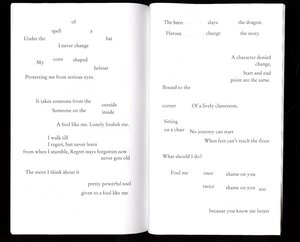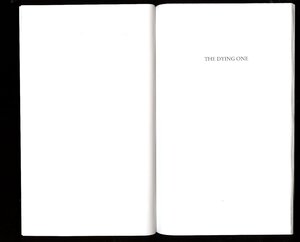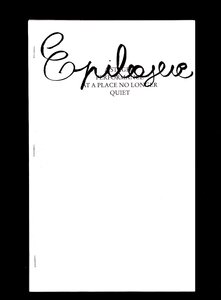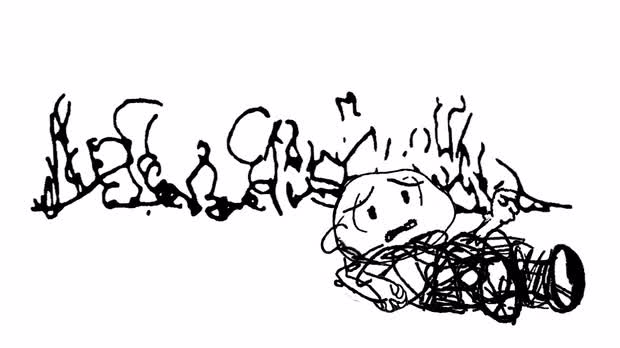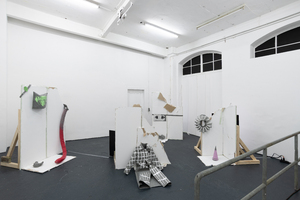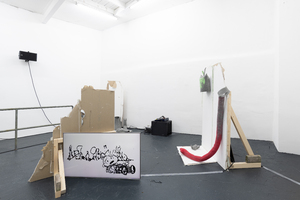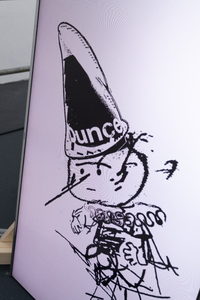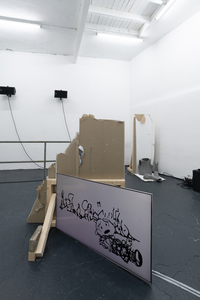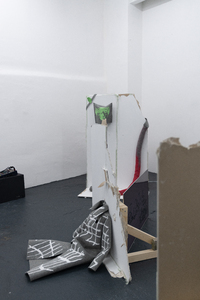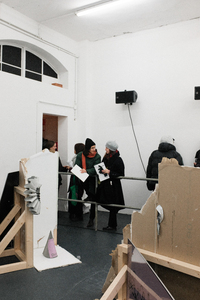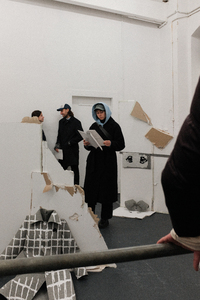Werk
Alle Inhalte mit Metadaten des Vokabulars "Werk". Sie sehen nur Inhalte, für die Sie berechtigt sind.
1908 Inhalte
- Seite 1 von 159
Epilogue to a staged performance at a place no longer quiet_03
- Titel
- Epilogue to a staged performance at a place no longer quiet_03
- Untertitel
- Publikation zur Ausstellung "a staged performance at a place no longer quiet"
- Autor/in
- Beschreibung (en)
- The publication to my exhibition serves not as an explanation but as an extension of my shown work. Printed on old paper stock and staple bound the publication recalls the revealing of the structural elements of narration and immersion in my exhibition. The texts are extended fragments of the animated characters' monologues.
- Kategorie
- Typ des Projekts/Werks
- Mitwirkende
- Abmessungen
- 18,5 x 30cm
- Ort: Institution
- Stadt
- Land
- Titel
- Epilogue to a staged performance at a place no longer quiet_03
- Urheberrechtshinweis
- © Jonathan Blaschke
- Rechtsschutz/Lizenz
- Medienersteller/in
- Beziehung/Funktion
- Medien-Beschreibung
- Die Publikation zu meiner Ausstellung dient nicht als Erklärung, sondern als Erweiterung meiner gezeigten Arbeit. Gedruckt auf altem Papier und mit Klammerheftung erinnert die Publikation an die Offenlegung der Strukturelemente der Narration und Immersion in meiner Ausstellung. Die Texte sind erweiterte Fragmente der Monologe der animierten Figuren.
- Medien-Beschreibung (en)
- The publication to my exhibition serves not as an explanation but as an extension of my shown work. Printed on old paper stock and staple bound the publication recalls the revealing of the structural elements of narration and immersion in my exhibition. The texts are extended fragments of the animated characters' monologues.
- Semester
- Studiengang
- Typ der Abschlussarbeit
- Importiert am
- 16.02.2024
- Übergeordnete Sets
- 1
Epilogue to a staged performance at a place no longer quiet_02
- Titel
- Epilogue to a staged performance at a place no longer quiet_02
- Untertitel
- Publikation zur Ausstellung "a staged performance at a place no longer quiet"
- Autor/in
- Beschreibung (en)
- The publication to my exhibition serves not as an explanation but as an extension of my shown work. Printed on old paper stock and staple bound the publication recalls the revealing of the structural elements of narration and immersion in my exhibition. The texts are extended fragments of the animated characters' monologues.
- Kategorie
- Typ des Projekts/Werks
- Mitwirkende
- Abmessungen
- 18,5 x 30cm
- Ort: Institution
- Stadt
- Land
- Titel
- Epilogue to a staged performance at a place no longer quiet_02
- Urheberrechtshinweis
- © Jonathan Blaschke
- Rechtsschutz/Lizenz
- Medienersteller/in
- Beziehung/Funktion
- Medien-Beschreibung
- Die Publikation zu meiner Ausstellung dient nicht als Erklärung, sondern als Erweiterung meiner gezeigten Arbeit. Gedruckt auf altem Papier und mit Klammerheftung erinnert die Publikation an die Offenlegung der Strukturelemente der Narration und Immersion in meiner Ausstellung. Die Texte sind erweiterte Fragmente der Monologe der animierten Figuren.
- Medien-Beschreibung (en)
- The publication to my exhibition serves not as an explanation but as an extension of my shown work. Printed on old paper stock and staple bound the publication recalls the revealing of the structural elements of narration and immersion in my exhibition. The texts are extended fragments of the animated characters' monologues.
- Semester
- Studiengang
- Typ der Abschlussarbeit
- Importiert am
- 16.02.2024
- Übergeordnete Sets
- 1
Epilogue to a staged performance at a place no longer quiet_01
- Titel
- Epilogue to a staged performance at a place no longer quiet_01
- Untertitel
- Publikation zur Ausstellung "a staged performance at a place no longer quiet"
- Autor/in
- Beschreibung (en)
- The publication to my exhibition serves not as an explanation but as an extension of my shown work. Printed on old paper stock and staple bound the publication recalls the revealing of the structural elements of narration and immersion in my exhibition. The texts are extended fragments of the animated characters' monologues.
- Kategorie
- Typ des Projekts/Werks
- Mitwirkende
- Abmessungen
- 18,5 x 30cm
- Ort: Institution
- Stadt
- Land
- Titel
- Epilogue to a staged performance at a place no longer quiet_01
- Urheberrechtshinweis
- © Jonathan Blaschke
- Rechtsschutz/Lizenz
- Medienersteller/in
- Beziehung/Funktion
- Medien-Beschreibung
- Die Publikation zu meiner Ausstellung dient nicht als Erklärung, sondern als Erweiterung meiner gezeigten Arbeit. Gedruckt auf altem Papier und mit Klammerheftung erinnert die Publikation an die Offenlegung der Strukturelemente der Narration und Immersion in meiner Ausstellung. Die Texte sind erweiterte Fragmente der Monologe der animierten Figuren.
- Medien-Beschreibung (en)
- The publication to my exhibition serves not as an explanation but as an extension of my shown work. Printed on old paper stock and staple bound the publication recalls the revealing of the structural elements of narration and immersion in my exhibition. The texts are extended fragments of the animated characters' monologues.
- Semester
- Studiengang
- Typ der Abschlussarbeit
- Importiert am
- 16.02.2024
- Übergeordnete Sets
- 1
dying one_Ausschnitt
- Titel
- dying one_Ausschnitt
- Titel (en)
- a staged performance at a place no longer quiet
- Untertitel des Projekts/Werks (en)
- Snippet(!) of one of the installation's five videos
- Autor/in
- Schlagworte
- Datierung
- 06.12.2023
- Sprache
- Ort: Institution
- Stadt
- Land
- Titel
- dying one_Ausschnitt
- Titel (en)
- dying one_snippet
- Urheberrechtshinweis
- © Jonathan Blaschke
- Rechtsschutz/Lizenz
- Medienersteller/in
- Medien-Beschreibung
- Dauer: 2:19 Minuten, Format: mp4
- Projektleiter/in
- Semester
- Studiengang
- Typ der Abschlussarbeit
- Importiert am
- 15.02.2024
- Übergeordnete Sets
- 1
A Staged Performance_15
- Titel
- A Staged Performance_15
- Titel (en)
- a staged performance at a place no longer quiet
- Autor/in
- Kategorie
- Schlagworte
- Datierung
- 06.12.2023
- Ort: Institution
- Stadt
- Land
- Titel
- A Staged Performance_15
- Titel (en)
- A Staged Performance_15
- Urheberrechtshinweis
- © Jonathan Blaschke
- Rechtsschutz/Lizenz
- Medienersteller/in
- Beziehung/Funktion
- Semester
- Studiengang
- Typ der Abschlussarbeit
- Importiert am
- 15.02.2024
- Übergeordnete Sets
- 1
A Staged Performance_14
- Titel
- A Staged Performance_14
- Titel (en)
- a staged performance at a place no longer quiet
- Autor/in
- Kategorie
- Schlagworte
- Datierung
- 06.12.2023
- Ort: Institution
- Stadt
- Land
- Titel
- A Staged Performance_14
- Titel (en)
- A Staged Performance_14
- Urheberrechtshinweis
- © Jonathan Blaschke
- Rechtsschutz/Lizenz
- Medienersteller/in
- Beziehung/Funktion
- Semester
- Studiengang
- Typ der Abschlussarbeit
- Importiert am
- 15.02.2024
- Übergeordnete Sets
- 1
A Staged Performance_8
- Titel
- A Staged Performance_8
- Titel (en)
- a staged performance at a place no longer quiet
- Autor/in
- Kategorie
- Schlagworte
- Datierung
- 06.12.2023
- Ort: Institution
- Stadt
- Land
- Titel
- A Staged Performance_8
- Titel (en)
- A Staged Performance_8
- Urheberrechtshinweis
- © Jonathan Blaschke
- Rechtsschutz/Lizenz
- Medienersteller/in
- Beziehung/Funktion
- Semester
- Studiengang
- Typ der Abschlussarbeit
- Importiert am
- 15.02.2024
- Übergeordnete Sets
- 1
A Staged Performance_5
- Titel
- A Staged Performance_5
- Titel (en)
- a staged performance at a place no longer quiet
- Autor/in
- Kategorie
- Schlagworte
- Datierung
- 06.12.2023
- Ort: Institution
- Stadt
- Land
- Titel
- A Staged Performance_5
- Titel (en)
- A Staged Performance_5
- Urheberrechtshinweis
- © Jonathan Blaschke
- Rechtsschutz/Lizenz
- Medienersteller/in
- Beziehung/Funktion
- Semester
- Studiengang
- Typ der Abschlussarbeit
- Importiert am
- 15.02.2024
- Übergeordnete Sets
- 1
A Staged Performance_12
- Titel
- A Staged Performance_12
- Titel (en)
- a staged performance at a place no longer quiet
- Autor/in
- Kategorie
- Schlagworte
- Datierung
- 06.12.2023
- Ort: Institution
- Stadt
- Land
- Titel
- A Staged Performance_12
- Titel (en)
- A Staged Performance_12
- Urheberrechtshinweis
- © Jonathan Blaschke
- Rechtsschutz/Lizenz
- Medienersteller/in
- Beziehung/Funktion
- Semester
- Studiengang
- Typ der Abschlussarbeit
- Importiert am
- 15.02.2024
- Übergeordnete Sets
- 1
A Staged Performance_1
- Titel
- A Staged Performance_1
- Titel (en)
- a staged performance at a place no longer quiet
- Autor/in
- Kategorie
- Schlagworte
- Datierung
- 06.12.2023
- Ort: Institution
- Stadt
- Land
- Titel
- A Staged Performance_1
- Titel (en)
- A Staged Performance_1
- Urheberrechtshinweis
- © Jonathan Blaschke
- Rechtsschutz/Lizenz
- Medienersteller/in
- Beziehung/Funktion
- Semester
- Studiengang
- Typ der Abschlussarbeit
- Importiert am
- 15.02.2024
- Übergeordnete Sets
- 1
A Staged Performance_5
- Titel
- A Staged Performance_5
- Titel (en)
- a staged performance at a place no longer quiet
- Autor/in
- Kategorie
- Schlagworte
- Datierung
- 06.12.2023
- Ort: Institution
- Stadt
- Land
- Titel
- A Staged Performance_5
- Titel (en)
- A Staged Performance_5
- Urheberrechtshinweis
- © Jonathan Blaschke
- Rechtsschutz/Lizenz
- Medienersteller/in
- Beziehung/Funktion
- Semester
- Studiengang
- Typ der Abschlussarbeit
- Importiert am
- 15.02.2024
- Übergeordnete Sets
- 1
A Staged Performance_3
- Titel
- A Staged Performance_3
- Titel (en)
- a staged performance at a place no longer quiet
- Autor/in
- Kategorie
- Schlagworte
- Datierung
- 06.12.2023
- Ort: Institution
- Stadt
- Land
- Titel
- A Staged Performance_3
- Titel (en)
- A Staged Performance_3
- Urheberrechtshinweis
- © Jonathan Blaschke
- Rechtsschutz/Lizenz
- Medienersteller/in
- Beziehung/Funktion
- Semester
- Studiengang
- Typ der Abschlussarbeit
- Importiert am
- 15.02.2024
- Übergeordnete Sets
- 1
